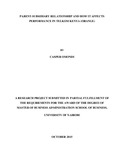| dc.description.abstract | Multinational corporations (MNCs) have played a major role in international trade for several centuries. A number of multinational corporations from developing economies are becoming key players in the global economy. Multinational corporations engage in very useful morally defensible activities in Third World Countries for which they frequently have received little credit. Compared to local firms, multinational corporations provide developing countries with critical financial infrastructure and enormous resource for economic and social development (Ogutu & Samuel, 2011). This study was guided by the agency theory. Taking an agency perspective, the relationship between headquarters and subsidiaries is also relevant. According to the Principal-Agency Theory (Eisenhardt, 1989) the agent acts out of self-interest (self-seeking behaviour) and the principal wants to be able to control the agent in such a way that they can enforce the agent to act in its interest. This principal becomes more relevant as the distance (geographically, culturally, and linguistically) between headquarters, subsidiaries become greater, and alignment of interests is less likely. Multinational corporations operate in a global environment unfamiliar in political, economic, social, cultural, technological and legal aspects. Increased competition among multinational corporations and the entry of other players in the Kenyan market necessitate the design of competitive strategies that guarantee performance.The objective of this study was to investigate parent-subsidiary relationship and how it affects performance Telkom Kenya (Orange). A case study method was adopted. The researcher primarily conducted direct, personally administered interview. The data collected was analyzed using the content analysis technique. This analysis method assists in understanding and interpreting the responses from the respondents. An in-depth understanding of the responses from the respondents was also used in the analysis. The study concluded parent subsidiary relationship at Telkom Kenya does influence coordination of policy and operations. The study also concluded Telkom Kenya is able to leverage on technology within the parents company ambit. Thus it enhances efficiencies than when operating on a standalone basis. Finally the study concluded that a clear feedback channel will improve the relationship and communication between the parent and Telkom Kenya so as to improve performance as well as to allow the subsidiary more leeway to localize some of the strategic options. Based on the findings the study recommended the study acknowledges that the parent plays a key role in influencing the performance of the subsidiary. The study finds there is a need by the parent company to allow the subsidiary leeway to localize some of the strategic performance options, so as to enhance its performance. Especially in areas which may be doing well locally but internationally stagnating. An example is Agricultural sectors in Kenya. While this is a growth area locally, the sector has been facing serious challenges in the Western World. Due to this, the parent is reluctant for the subsidiary to venture into this sector aggressively as it is perceived to be a high risk sector. The subsidiary should be allowed to strategically enter into these markets as the parent company stands to benefit at the end of the day. | en_US |

